- Yachting for beginners
- Owning a yacht
- Motor Yachts
- Sailing Yacht
- Indian Ocean
- Mediterranean
- Buying or Selling a Yacht
- Yachting Events
- FAQ – Luxury Yacht Charter
- FAQ – Buying a Yacht
- FAQ – Sell your Yacht
- How Much Does It Cost To Charter A Luxury Yacht?
- All our Blog Post & News


Yacht crew positions : Hierarchy, Missions & Salaries explained
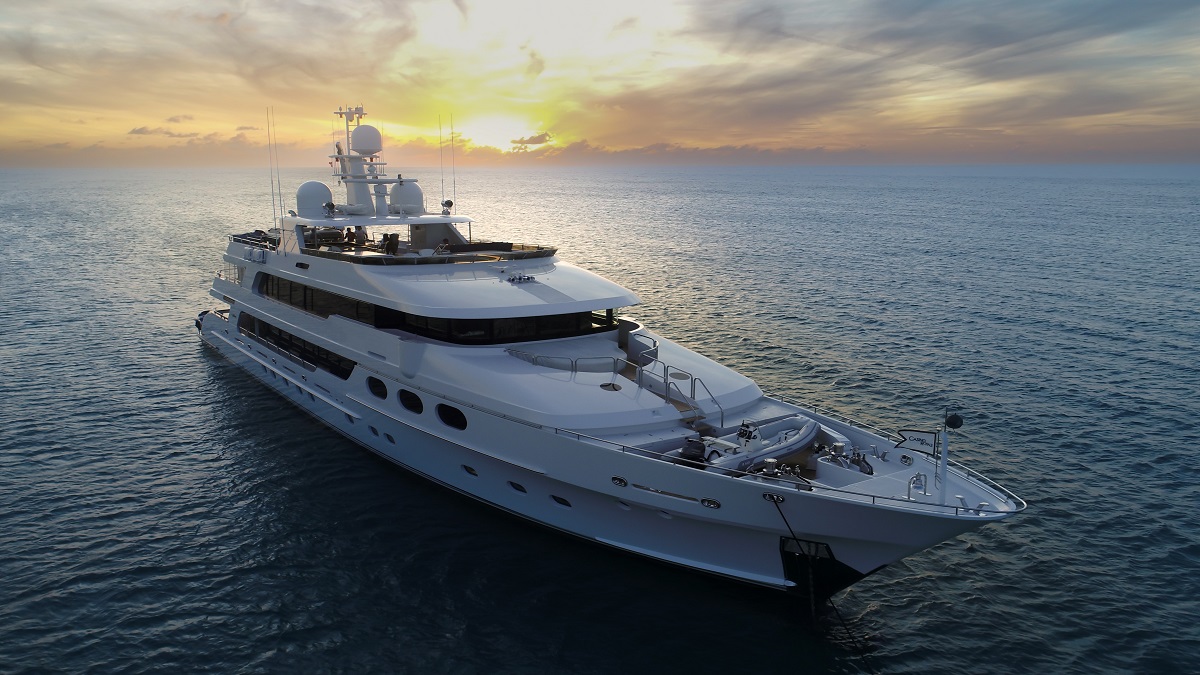
Like any well-run hotel, restaurant, or other luxury service, a crewed yacht needs organized structure and good management. Whether you’re staffing your own luxury vessel or looking for an exciting career working and traveling the world, you need to know how this structure works, and what you can expect to pay or earn and do in the various roles on board.
Every yacht is a little different, and organization may reflect the style of the captain or the demands of the owner. But the same jobs need to be done on almost every boat. Organized with ranks, heads of each division report to the Captain. It’s not a military-style organization, but there are parallels with merchant marine grades and structures.
Smaller yachts need fewer crew, and staff may wear multiple hats that cross more traditional divisions and may combine some jobs with others. Large yachts have more distinct divisions or subdivisions, with more specialization to divide tasks and manage staffing. The core skills are the same, but finding staff with the right blends to do the jobs is key. Crew with broader skills are highly sought after.
As a yacht owner, you shouldn’t have to worry about day-to-day management decisions or organizing all this. That’s why you have a captain, and it’s better to leave staffing decisions entirely up to him or her. But it’s still important to know what it is people you’re hiring do, why they’re there, and how many you need. You don’t want too many crew, or to be short-handed. An understanding of what your yacht needs helps you talk to the captain to keep your yacht running how you want it.
For those looking to break into yacht crew work, consider your skills and strengths, and what jobs appeal to you. You’ll need training before you work, and you can direct your job path through the training you seek. Your goal is a suitable position on a well-run yacht, so make yourself the most attractive candidate possible.
Yacht Work Life
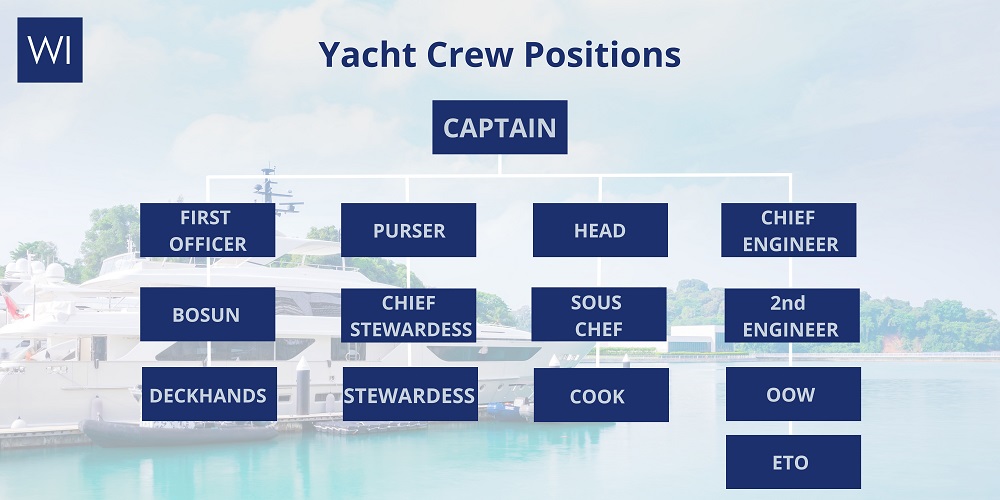
Working on a yacht is also living on the yacht. Crew must have a space to sleep, food, and all the basics that any employee needs. Large yachts have space reserved for crew, and owners looking for quality crew should provide good working and living conditions. Your crew takes care of you, and you should take care of them.
Depending on where a yacht operates or what flag she flies, a variety of labor laws or rules may be in effect. These requirements may be for work visas, contracts and written agreements, and compliance with merchant and ship crew treaties and laws. Be prepared to have work and non-disclosure agreements between yacht and crew, though a few yachts skip this.
Seasonal Jobs
Many yacht positions are seasonal. Year-round employment is more likely for senior crew like the captain and department heads, but not all yachts see year-round use. And some yachts may use different crew in different locales between seasonal moves.
Any job listing should give seasonal information, with geographic information, the length of the season, and the prospects for year-round positions and repeat employment.
Hours, Salaries, and Expectations
Yacht crew is a service job at its core, and every yacht owner is looking for service-oriented people who understand how to deliver a hotel-quality living and restaurant-quality fine dining. Work experience in luxury hotels and restaurants is a big plus for some jobs, and makes breaking into yacht work easier.
Yacht work can be very demanding, with periods of intense work when the owner and guests or a charter party is on board. Long days aren’t uncommon, but often balance with slack time when the boat is empty of passengers. There is always work to be done, but there’s usually a chance for time off.
Most salaries are monthly, since many positions are seasonal. Pay ranges are commensurate with experience, rank, and responsibility. Private vessels usually offer higher base pay, as charter crew can earn tips on top of their base salary. Because of the demands of the lifestyle, compensation is good and you have minimal living expenses on board.
Benefits and Time Off
Because so many jobs are seasonal and may occur in different countries and locations, benefits offered to yacht crew vary widely. But it is not uncommon for crew to be offered health and accident insurance and a flight to the vessel. Living on board, you’ll get food, rooming (usually shared), basic toiletries, uniforms, and laundry. Yachts with a longer view may offer additional training to long-term prospects.
Time off is usually linked to boat use, and may be sporadic in-season or when the boat has the owner and guests on board. There will always be some time off, but it may be between very intense work periods.
Most crew jobs have an employment contract that meets the Maritime Labour Convention 2006 (MLC). This should spell out the contract period and duration, as well as salary, leave and time off, probationary periods, repatriation policies, and any other crucial details to meet the minimum international standards of crew welfare.
This contract should also contain shipboard policies on confidentiality and non-disclosures, drug and alcohol use on board, personal hygiene expectations, interpersonal relationships, and dispute resolution. Job expectations and requirements can also be included, with specific language about roles, tasks, and cooperation between divisions.
Note that all crew agreements will explicitly prohibit drug use on board, most limit alcohol consumption and ban hard liquor on board, and many boats have policies prohibiting intimate personal crew relationships. Because the crew is living on board full time and in close quarters, rules to maintain decorum and crew harmony may be in writing.
Training & Certificates
Two key certifications are required for yacht crew. Employers look for the STCW (Standards of Training, Certification and Watch-keeping for Seafarers) and the ENG1 (Seafarer Medical Certificate). Insurers generally require crew to have these two certifications or the equivalent.
The ENG1 isn’t a class. It’s a medical exam to ensure that the crew is physically fit to serve at sea and has no underlying conditions that may arise far from help. It’s best for prospective crew to secure the ENG1 before investing more time and money training.
STCW is a week-long class on the basics of onboard safety. This includes hands-on modules covering personal survival, fire safety, first aid and CPR, accident prevention, and security awareness. It needs to be refreshed every five years.
Shared, Hybrid, and Crossover Jobs
Larger vessels will have more defined duties and specific areas of responsibility. But smaller yachts may want the crew to have different roles in different situations. For example, a hybrid job description may read “3rd Engineer/Steward” and describe a role in engineering when the boat is empty but on inside crew when passengers are on board.
When hiring or seeking jobs be prepared to look for creative crossover skill sets to meet the needs of the vessel.
Extra Skills and Duties
Any extra skills outside the regular duties makes crew more attractive. From stewards who can teach yoga, give massages or play cocktail piano to deck crew who know how to water ski, SCUBA dive, or fish, anything that crew can bring to enhance the passenger experience adds value to the employee.
If you’re looking for a position, list the skills you’d be comfortable using. If a vessel owner is looking for something specific, spell it out and figure out how that special duty fits into the employee work day.
The Four Main Divisions

Most yacht crews break into four primary divisions which group related tasks and responsibilities together. While the grouping sounds like it’s by section of the boat, they’re really more functional. For example, stewards (Interior) will definitely serve meals, whether they’re in the main dining room or out on deck. Deckhands (deck) are going to be involved in painting, sanding, and varnish jobs anywhere on the boat.
The deck crew handles most of the exterior operations of the yacht, and runs it. Deck hands and crew keep the boat looking clean and shiny, and handling most vessel operations. This includes driving and operating the yacht, navigation, running all launches and ship’s craft, handling lines, and all maintenance and painting, washing, and shining.
2-Interior (or Inside)
Inside crew are primarily the stewards and housekeepers. Larger vessels will have a dedicated housekeeping staff separate from the stewards, but smaller vessels may not.
Stewards keep the interior clean, do all housekeeping, laundry, food and beverage service, cabin preparation, and anything else needed for the comfort of the passengers.
3-Engineering
Below decks, the engineering department ensures the safe and smooth running of all the ship’s machinery and electronics. Engineers are engine and systems specialists, and there will usually be a dedicated electronics expert. Most engineer jobs require professional training and certification.
Fine dining is a hallmark of the yachting experience, and a full-time galley crew prepares all meals for passengers and crew. The head chef plans the menus and provisions the boat, while junior chefs assist the head chef with meal preparation and keeping the galley spotless.
Yacht Job and Department Details
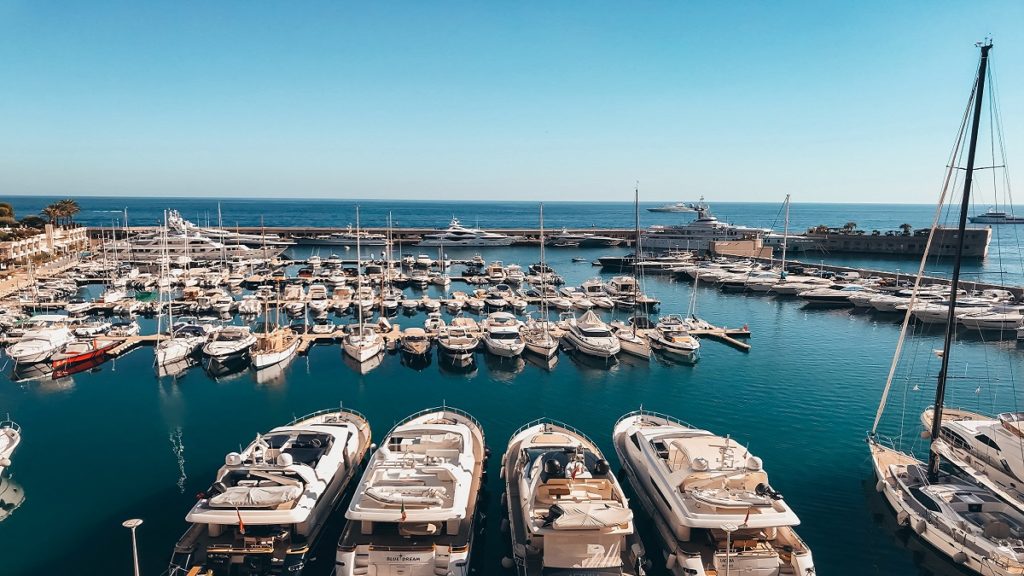
Departments are all organized in a hierarchy, with a department head reporting to the Captain. The clear chain of command makes for smooth operations, with all communications going up and down ranks. Junior staff will occasionally take instructions from other divisions as all crew is expected to help as needed. A captain or department head may organize staff differently, so reporting structures listed are guidelines only.
All salary ranges are monthly figures and are ranges based on yacht size and crew experience. Senior jobs on larger yachts have more responsibility than the same job title on yachts with smaller crews. Experienced crew are very desirable and can expect more pay for their positions.
Listed responsibilities are not exhaustive, and different yachts may allocate some jobs to different positions.
Read also: The yacht charter experience ladder
The Captain

The captain of the vessel is the overall decision maker for the yacht in all situations, including the safety of the vessel. The owner should leave the Captain responsible for operational decisions about hiring and staff and operating the ship. To become a captain requires years of experience and training, and a broad set of skills including yacht operations, personnel management, budgeting and finance. The captain works directly with the owner and owner’s representative, if the captain is not also acting as the representative.
On an organization chart, the Captain is usually placed in the deck division, but the Captain is always the senior-most crew on the yacht and all division heads report to the Captain.
Responsibilities include:
- Responsible for all navigation and running the yacht.
- Senior decision maker on all crew hiring.
- Manage repairs, refits, and yard work.
- Manage budgets and accounting. On larger yachts, this task ends more on the Purser, but the captain is always responsible.
- Ensure all paperwork, clearances, and legal requirements are completed.
- Primary contact with the owner or charter parties.
Reports to: The yacht owner
Salary Range: $6,000 to $22,000
The deckhands handle all the outside responsibilities of the ship, including cleaning and maintenance of the yacht and all the ship’s vessels and toys on board. Deck crew will have significant contact with passengers in this role, operating launches and delivering guests to and from shore and handling the toys.
All deck crew have watch responsibilities on passage, and daily responsibilities keeping the yacht pristine and clean. They will also do line handling and secure the yacht.
Deck department : Chief Mate/First Officer
The Chief Mate or First Officer is the second in command of the vessel, and left in charge when the Captain is not on board. The first mate has the requisite skills to stand in for the captain and run the yacht if needed and usually acts as the division head of the deck team.
The seamanship skills needed are similar to the Captain’s position.
- Primary safety officer for the yacht and all passengers and crew.
- Supervise and manage all operations on deck.
- Bridge watches on passage.
- Passage planning and navigation.
There may be additional mates on larger vessels, these 2nd, 3rd, etc. mates have similar responsibilities on rotation. But the first mate is senior and always second in command.
Reports to: Captain
Salary Range: $4,000 to $9,500 (First mate)
Second and more junior mates may earn $2,000 to $4,000
Deck department : Bosun
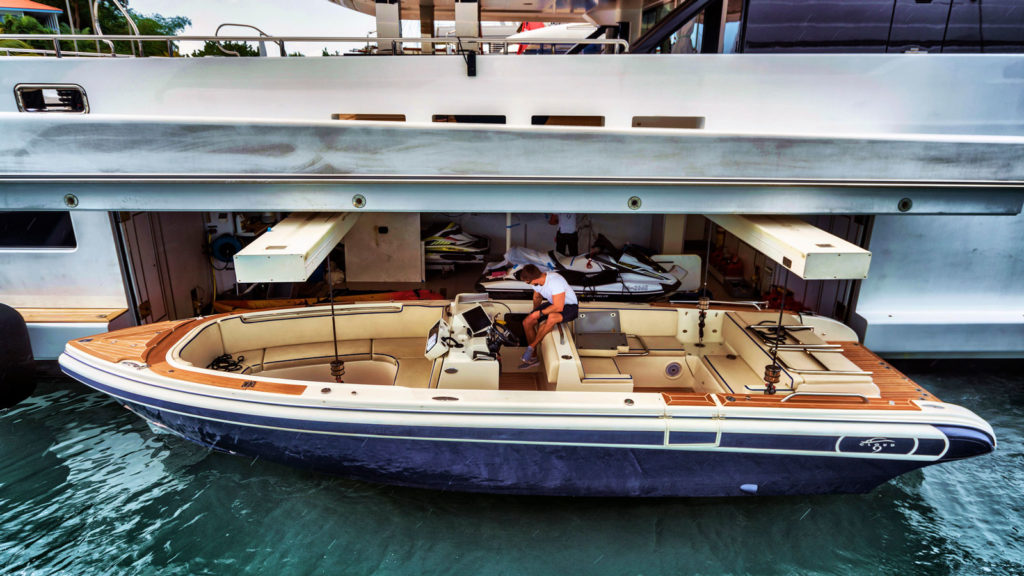
The Bosun is the senior deckhand and manages the junior hands on board. This will usually be the most experienced hand on board.
- Organizing all operations on deck.
- Coordinating the use, storing and launching of the ship’s boats, toys, and equipment.
- Managing the passerelle, watching passenger safety.
- Contact point for guest service on boats, toys, and trips to shore.
Reports to: First mate
Salary Range: $3,000 to $5,000
Deck department : Deckhands
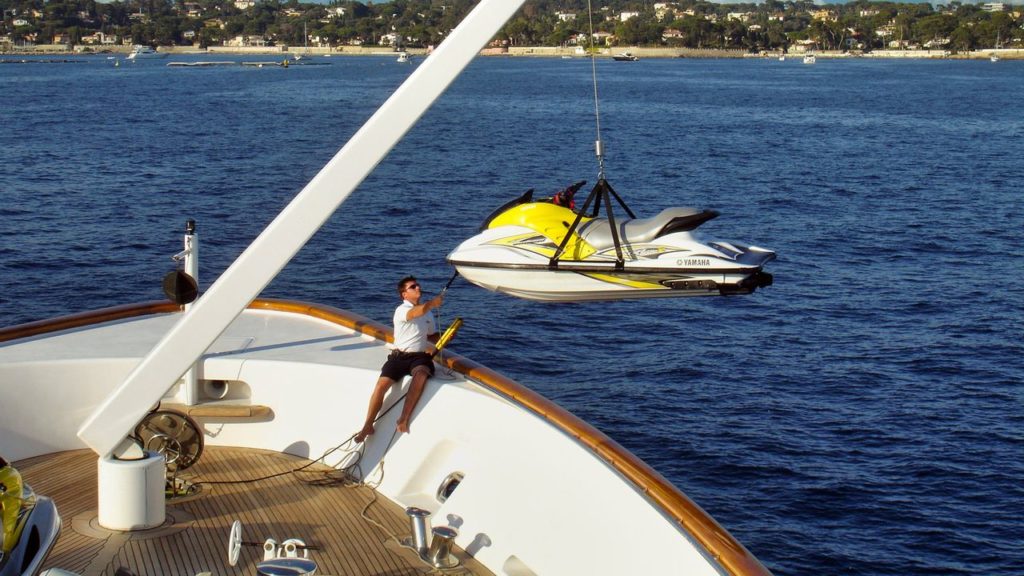
Deckhands are constantly busy with maintenance, cleaning, polishing, and assisting guests as needed. They will assist other departments as needed or given special duties.
- Daily cleaning of the yacht’s exterior.
- Painting, varnishing, polishing.
- Line handling.
- Launching and operating dinghies and tenders.
- Repairs and carpentry.
- Helping guests as needed – everything from handling baggage and gear to embarking and disembarking.
Reports to: Bosun
Salary range: $1,300 to $3,000
Though every position on a yacht is service-oriented, the interior or inside crew provides the primary customer service. They will interact the most with the passengers daily, and they’re directly responsible for the quality of their experience on board.
Interior department : the Purser
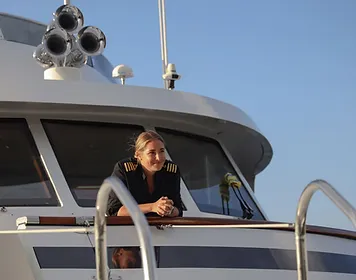
The purser is the chief financial officer of the yacht and handles all the financial operations on board. Accounting, purchasing, payroll and hiring, and all money matters end up with the Purser. This is a senior staff position, and may be the interior department head. Smaller yachts may eliminate the purser’s job and add it to the captain’s and other senior staff duties.
Responsibilities Include:
- Accounting and bookkeeping for all financial transactions.
- Human resources and payroll.
- Handling logistics for all departments related to purchasing.
- Managing contracts.
- Event coordination, including off yacht bookings and payments.
- Primary administration of the boat’s business paperwork.
- Inventory and supply management.
Salary Range: $4,000 to $8,000
Interior department : The Chief Steward/ess

The chief steward or stewardess has primary responsibility for all service roles inside. Food and drink service, cabin preparation, and anything to do with helping the passengers be more comfortable and enjoy their stay. The chief steward will be inside crew with several years of experience.
The chief steward manages the interior staff, setting and enforcing vessel service standards. The chief steward ensures the crew delivers a five-star hospitality experience.
Chief Steward Responsibilities:
- Scheduling and training junior crew for meal and drink service and cabin preparation.
- Primary contact with guests for meals and drinks.
- Sommelier and wine service.
- Coordinate with the galley for meals and presentation.
- Decorate the interior, from flower arrangement to table settings.
- Arrange onshore activities and outings.
Reports to: Captain or Purser, depending on the yacht
Salary Range: $4,000 to $8,500
Stewards/Stewardesses
The stewards and stewardesses are the primary guest service staff. They will work closely with guests and passengers, and have daily contact with them as they meet most of their needs while on board.
Steward Responsibilities:
- Food and drink service.
- Room preparation and turndown service.
- Cleaning, polishing, housekeeping, and inside maintenance.
- Cabin detailing.
- Laundry, pressing, and folding.
- Help with outings, trips, debarkations.
Reports to: Chief Steward
Salary Range: $1,500 to $4,500
Housekeeping

Larger yachts may have a dedicated housekeeping and laundry staff. This will be part of the inside crew, under either the purser or the head steward. There may be a senior housekeeper, if there are more than one housekeeping crew on board.
Responsibilities are the cleaning and laundry portions of the steward’s job, and a laundry steward may spend most of her time inside the ship’s laundry.
An experienced Head of Housekeeping may earn from $4,500 to $7,000, while a Laundry Steward typically earns from $2,500 to $3,500.
Read also: CAN OWNING A YACHT TO CHARTER (REALLY) BE PROFITABLE?
Food service requirements on any yacht are high. Whether it’s a privately owned vessel or a charter, the expectations are always for top tier food service, with a variety of meals planned for the requirements of every passenger. Chefs and cooks prepare all meals on board for passengers and crew, but sometimes other interior crew may help with prep work or cleanup.
Smaller yachts have smaller galley crews, but the largest vessels may have an executive chef and several sous chefs. All chef positions require formal culinary training and experience, but cook positions are often entry level. Promotion from cook to chef is unusual without additional training.
Galley department : the Head / Executive Chef

On larger yachts, an Executive Chef will run the entire galley with the help of sous chefs and cooks. With an Executive Chef, there’s an expectation that the food and menus will be on a level with Michelin star-rated restaurants.
The executive chef brings a thorough understanding of food preparation and presentation, and moves food preparation past creative up to artistic. Job responsibilities are similar to a chef, but the job demands and the required experience and education are much higher.
Salary range: $7,000 to $11,000
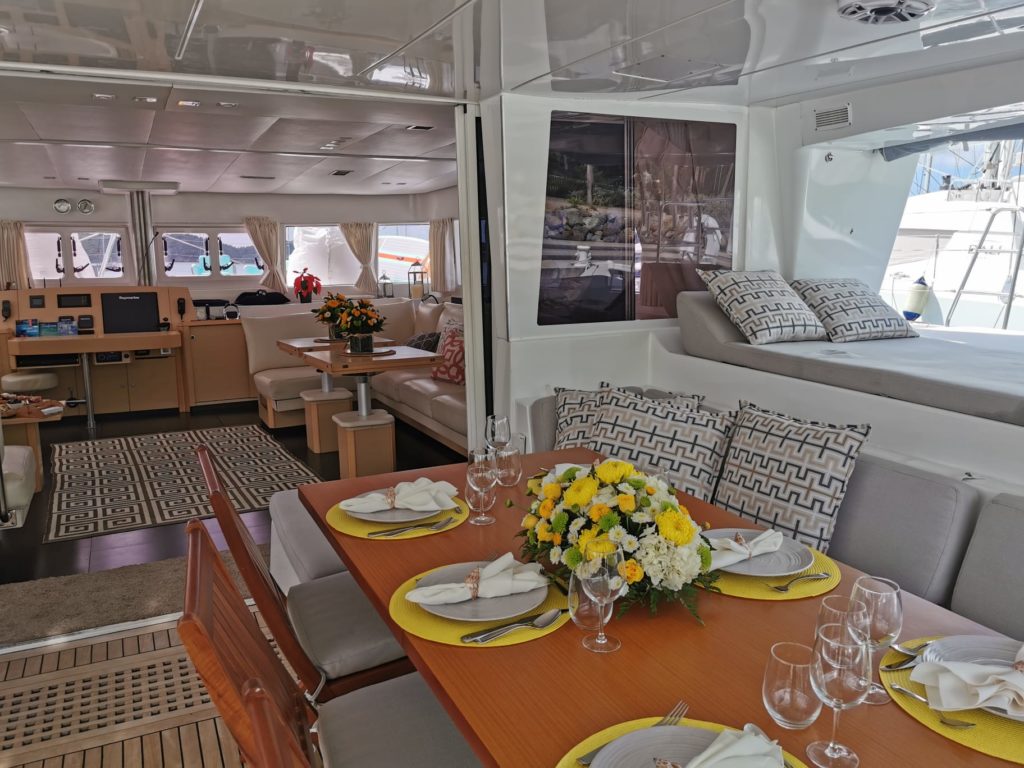
The chef has overall responsibility for all meals on the yacht, from provisioning in remote places to hygiene and good safety. If there’s only one chef, she’s the head of the galley crew. Finding the best provisions in far away locations and making the best of local food availability is a major part of the job.
- Planning a delicious and varied menu for passengers.
- Sourcing all food and arranging transport to the yacht.
- Maintaining and operating within the galley budget.
- Preparing passenger meals with professional presentation and style.
- Cleaning and maintaining galley and galley equipment.
- Deliver menus and meals on time, while running an organized and spotless galley.
Galley department : Sous Chef
The sous chefs assist the chef in all aspects of running the galley, and may have independent assignments to plan and guest and crew meals. While not primarily responsible for provisioning, the sous chef will help with food selection, menu preparation, and planning. A sous chef must have formal culinary training.
Reports to: Head chef
Salary Range: $3,500 – $6,000.

Galley department : The Cook
Cooks may be entry-level positions or experienced, but do not require formal gastronomy education. They will assist the chef and sous chefs, cooking meals and dishes for guests and crew, helping with provisioning, and keeping the galley neat.
- Assist with provisioning and buying high-quality food from local sources.
- Follow all food handling and safety guidelines.
- Assist the head chef as needed, taking direction and guidance.
- Prepare guest and crew meals as required.
- Staying on top of galley inventories and supplies.
Salary Range: $2,500 to $3,500
Engineering

The engineering department keeps the yacht and all its systems working. Whether it’s the engines, electronics, air conditioning, or the plumbing – it’s up to engineering to keep it running.
There is considerable overlap with commercial shipping in the engineering field, as many of the same skills apply. And there is a broader range of qualifications and grades based on the size and power of the vessel. Job ratings may be set by required experience based on tonnage of ship or power of engines, with corresponding levels of pay and responsibility.
Unlike commercial shipping, engineers may get involved in other aspects of running the yacht, like helping with docking and water sports with mechanical toys.
Engineering certifications, training, ratings, experience and licensing are critical to hiring competent engineers, and for engineering crew it’s an important facet of career advancement. This is important for Chief and 2nd Engineers, which are often broken out by MCA (U.K. Maritime and Coastguard Agency) rating or other international equivalent.
MCA ratings for engineers Commercial and Private Yachts over 24m are:
Y4: Less than 200 Gross Tons and less than 1,500 kW engine power Y3: Less than 500 GT and 3,000 kW Y2: Less than 3,000 GT and 3,000 kW Y1: Less than 3,000 GT and 9,000 kW
There is also an unlimited rating for merchant vessels larger than the Y1 category. For discussing salary and responsibilities, we will include all ratings in one position description, but pay scales with the size of the yacht and any required higher ratings.
Chief Engineer
The chief engineer manages all aspects of keeping the yacht and its systems running. The chief engineer manages all the engineering staff, and directs all maintenance, repairs, troubleshooting and upgrades. This is a management position, but requires extensive hands-on technical experience and knowledge. Chief engineers on large yachts hold an MCA Y1 or Y2, smaller boats will have a lower rated chief and a smaller staff. Check Jooble.org to find abroad marine engineer vacancies.
- Provisioning, shopping, and stocking.
- Preparing passenger and crew meals.
- Following instructions and cooking under the direction of others.
- Galley cleaning.
- Follow food safety and storage procedures.
- Food pre-preparation.
Salary Range: $6,000 to $15,000
2nd Engineer
The second engineer is also a highly skilled position requiring a rating or license and several years of experience. This senior level engineer also needs knowledge of how to troubleshoot and maintain all yacht systems.
- Maintain and manage all engineering operations.
- Hire, train and supervise all engineers.
- Project manage all upgrades and retrofits, including managing budgets, contracts, and suppliers.
- Coordinate maintenance schedule for the entire yacht around the usage and seasonal schedules.
- Maintain costs and accounting for engineering operations.
- Design and handle all safety operations.
- Set and maintain standards for operations and cleanliness in the engine room.
Reports to: Chief engineer
Salary Range: $5,500 – $10,000
OOW (Officer of the Watch) Engineer
The OOW is a junior engineering position, but still licensed. There are two categories of OOW – MEOL (Marine Engine Operator License) and the more junior AEC (Assistant Engine Course). The overall responsibilities are similar, working to support the senior engineers and handle independent assignments. The AEC rating is entry level for licensed crew, but has training and certification.
- Support the chief in all projects.
- Maintain a clean, safe engine room.
- Perform all maintenance, troubleshooting and repair tasks as needed.
- Support motorized water sports.
- Occasionally assist with other vessel operations, like line handling.
Reports to: Chief Engineer
Salary Range, MEOL: $4,500 to $6,000 Salary Range, AEC: $2,500 to $3,500
Electronics/Technology Officer (ETO)
The ETO takes responsibility for all audio-visual and information technology on board. Ensuring passengers have access to the internet, movies, television, and music is a primary responsibility. This position carries a fair amount of passenger interaction, and an ETO needs good troubleshooting skills to go with customer service skills.
- Ensure all audio/visual and entertainment systems are always available for passengers.
- Assist passengers with personal technology and ship systems as needed.
- Conduct regular maintenance and upgrades of the network, information, and A/V systems around passenger schedules.
- Assist other engineers as needed, especially with electronic systems.
- Contribute as needed with other departments for boat and passenger operations.
Salary Range: $4,000 to $9,000
Junior Engineer
This is a lower or entry level position for someone with engineering skills but without formal licensing or certification. The junior engineer will help with safety and cleanliness, and assist in any engineering tasks as needed. The ability to solve problems and fix things opens this spot for anyone capable and willing to do the job.
- Help with cleaning, maintenance, and safety functions.
- Help anywhere needed on the yacht.
- Assist senior engineers as needed, taking direction and following instructions exactly.
- Constantly develop skills.
Read also: IS BUYING A BOAT A BAD IDEA?
Whether you are a yacht owner or considering entering this dynamic industry with an established and reliable crew, it is essential to have an understanding of the yacht’s hierarchical structure, mission priorities, and salary expectations. By doing your research on the complexity of yachting before hiring your team, you can confidently select the right group of experienced and qualified professionals for your needs. Staying up-to-date on top industry trends and knowing the capabilities of each type of yacht crew position will enable you to make sound decisions that support a safe and cost-effective journey. With quality personnel at your helm, you can cruise unhindered in luxury and explore new destinations with peace of mind.
Fractional Yacht Ownership : Everything you Need to Know
What is the best country to register your yacht offshore, you might also like.

What differentiates a yacht from a superyacht or a mega yacht?
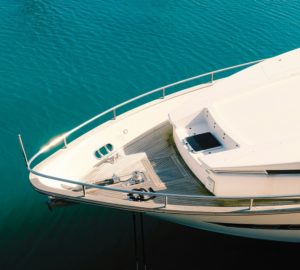
Chartering Requirements and Regulations: A Guide for Boat Owners

What are the Fastest Cruising Catamaran on the Market?
Essential Guides
Ocean Mapping
New to Yachting
ESSENTIAL YACHT QUALIFICATIONS
Qualifications required to work on board a yacht.

All crew, regardless of their position on board, need to have completed the STCW Basic Safety Training along with obtaining a recognised Seafarers medical certificate, the most popular being the ENG1 which is issued by an MCA ( Maritime and Coastguard Agency ) professional medic.
Without these two certificates, a yacht crew recruitment agent cannot assist you in finding work onboard a yacht .
STCW Basic Safety Training
STCW is a one week long course that provides students with an important introduction to working at sea and the necessary safety knowledge.
STCW stands for ‘Standards of Training, Certification, and Watchkeeping’ and is required for all crew who are working onboard commercial ships or superyachts.
The course teaches the basics of staying safe at sea and it comprises of 5 modules:
Personal Survival Techniques
Fire Fighting and Fire Prevention
Elementary First Aid
Personal Safety and Social Responsibility
Proficiency in Security Awareness
The STCW certification is valid for 5 years from completion of the course, and after that you are required to take an STCW Refresher Course in Fire Fighting and Sea Survival . So, prior to looking for work onboard a yacht, you must make sure all your certification is up to date.
The good news is that there are training centres all around the world where you can complete the STCW course and obtain your certification. Research online to find the nearest centre to you and get started. The course takes 5 days to complete so make sure you have accommodation nearby.
It's also important to ensure that your certificates are issued in English and that the course is certified either by MCA or the national maritime organisation of the country where you take your course.
Seafarers Medical Certificate
Seafarers Medical Certificate is a medical test performed to establish whether your health and your level of fitness allow you to work at sea. The most popular Seafarers Medical Certificate is ENG1 which is issued by an MCA approved doctor but you can also get an equivalent counterpart test in your country.
ENG1 is valid for two years so you will have to make sure to renew it regularly before it expires. Always keep an eye on your expiry dates because, as yacht crew, you might find yourself in the middle of the season with no way of renewing it instantly.
Without a valid Seafarers medical certificate, it is illegal for you to stay and work on board, so always make sure your certificates are up to date.
You can research online to find a medical professional certified to issue a Seafarers Medical Certificate near you.
See the list of MCA approved doctors based in the UK . See the list of MCA approved doctors outside of the UK . See the list of Countries whose seafarer medical fitness certificates are accepted as equivalent to the UK ENG1.
There are two essential certificates all yacht crew need to have to be able to work on board a yacht, regardless of their role.
Other essential guides.

What you need to know about B1/B2 visa

Download yacht crew CV templates

How to write a memorable yachting CV

How to prepare for a yacht interview?

What are the two main yachting seasons?

Big yacht crew hubs you should know about

Is yachting the right choice for me?

Yacht crew salary guide
Explore yacht roles
Download the full ypi crew recruitment market report.
Download the YPI CREW Recruitment Market Report for an in-depth analysis of current trends in superyacht crew recruitment. Gain valuable insights into the market dynamics and trends specific to each department, providing a comprehensive overview of the industry landscape.
Explore the latest in yachting

Olympic Grit and Resilience: What Yacht Crew Can Learn from Elite Athletes

YPI CREW Announces its 2024 Superyacht Recruitment Market Report

Mind the Gaps: How to Explain Employment Breaks on Your Yacht Crew CV

YACHT CREW GUIDES
Learn about different positions on board a yacht.

YACHT CREW SALARY GUIDE
Let’s get started. call us on +33 (0)4 92 90 46 10 or email us., our mission, vision and values, mlc 2006 compliance, essential guides, yacht crew positions.
Chief Officer
Second Officer
Third Officer
Chief Engineer
Interior Crew
Head of Service
Head of Housekeeping
Specialist Positions
Spa Manager
Spa Therapist
Personal Trainer & Yoga Instructor
Hairdresser
Mandatory Certificates
B1/b2 visa information, how to write a memorable cv, how to prepare for an interview, yachting seasons, yacht crew salary guide, is yachting the right choice for me, cv templates, ocean mapping, new to yachting.
+33 (0)4 92 90 46 10
Impartial training and careers advice
Call us: +441983 280 641
+441983 280 641
- How to become a Yachtie
So you’re thinking about becoming a Yachtie?
You may have a friend or relative who already works in the industry, or you have watched TV programmes like Below Deck , you know working on a yacht is the right for you, but where do you start?
With the potential to earn great money, travel, and work with loads of like-minded people, it’s not surprising this job ticks a lot of boxes for many people.
Becoming a Yachtie and getting paid to work on luxury yachts may seem like a job and industry that only the elite can have access to, or it just seems too confusing to start.
However, with an understanding of the requirements, certification, and having some expectations of what job role you should be looking for, starting work as a Yachtie will not seem so daunting.
What is a Yachtie?
Before we go any further, let’s make sure we are all singing off the same hymn sheet.
A Yachtie is a broad term used to describe anyone who works on a yacht. More specifically, it has become the term for people working as yacht crew on superyachts.
A superyacht is a very large boat that is extremely luxurious and often owned by multi millionaires and billionaires.
These Yachties who work on superyachts hold a number of different positions. Most Yachties will start their superyacht career working as a Deckhand or Stewardess. With more experience and responsibilities, your role will change as you progress up the career ladder.
It’s worth noting there are other types of yachting and Yachties. The other kind of ‘Yachtie’ could describe those who hold their Yachtmaster qualification and have jobs like skipper charter boats.
Job roles for new Yachties
Yachties new to the industry (also known as ‘Green’ Yachties) will traditionally apply for entry levels roles, which are Yacht Deckhands or Yacht Stewardesses.
These are both very different jobs, so you need to be sure which one you want to do and start training for that career path.
Yacht Stewardess (Stew)
A Stewardess, or Steward , looks after the interior of the yacht. This means anything that happens inside the boat, you will be responsible for it.
Think of any job in the hospitality industry and then combine it into one role on a yacht, that is what you will be doing.
From making beds, doing the laundry, cleaning, serving food, and hosting dinner, you will do it all to a 5-star standard. Anything less than perfect, and your guests won’t be satisfied.
It’s the small things that make the difference between high standards and exceptional standards. You must have a great eye for detail and be able to make sure no stone is left unturned. Everything on board the ship must be 100% perfect at all times.
You will be reporting to Chief Stew, who will be your manager and give you your task list. After a good few seasons as a green Stewardess, you will have enough experience and confidence to apply for Chief Stewardess roles.
Yacht Deckhand
In contrast to the Stewardess role, Deckhands look after the exterior of the boat.
Predominantly a male role, Deckhands will do everything from general maintenance to cleaning the teak deck, looking after the toys (Jet Skis, etc.), and even driving the tenders.
Deckhands should know how a yacht operates, the basic terminology used onboard, how to tie knots, and loads and loads of enthusiasm.
Deckhands may also dip in and out of helping the Stewardesses, and it isn’t uncommon for Deckhands to give a hand during busy evening meal preparation and service.
5 steps to Becoming a Yachtie
With an understanding of the job roles available, you can now decide which one best suits you. With the right attitude, qualifications, and knowing where to look for work, becoming a Yachtie is achievable for anyone who wants it.
- Have the right attitude
- Pass an ENG1 medical
- Complete STCW Basic Safety Training
- Gain experience
- Go to a superyacht marina
1. Have the right attitude
Along with gaining the correct qualifications to prove your competence, to become a Yachtie, you must have certain characteristics to thrive in this industry.
Yachties have to be well presented, articulate, know how to take orders, and be able to work hard, all with a smile and enthusiasm. You have to be able to work incredibly long hours, sometimes under stressful conditions, without losing your patience.
Having a job on a superyacht may sound glamorous, but if it’s your 10th day working in a row and you’ve got your head stuck down a toilet trying to clean it, you may want to think again. To become a Yachtie, you have to be happy with spending a lot of time away from home without seeing your friends and family. This may all seem obvious, but this situation does not suit everyone, and without careful consideration of the negatives, you will leave this industry quicker than when you arrived.
2. Pass ENG1 Medical
The first actionable step you need to take to become a Yachtie is gaining an ENG1 medical certificate. The ENG1 medical is an examination by an approved MCA (Maritime and Coastguard Agency) Doctor to make sure you are fit and able to work at sea.
Every single person working at sea must have an ENG1 medical certificate , without this, you are not able to start working on superyachts. The examination will take around 45 minutes, during which the doctor will go through a checklist to make sure you have no underlying health conditions that may impact the safety of you or anyone else on board the ship.
The most common reason new yachties fail the ENG1 is colour blindness. Surprisingly many people can go through their whole life without knowing they are colour blind. However, on board a ship, this can have huge implications. If you cannot identify signals and lights correctly, it will be impossible for you to help navigate the ship in an emergency. Unfortunately, this means you cannot start work as a Yachtie.
3. Complete STCW Basic Safety Training
Another requirement for working at sea is completing STCW Basic Safety Training . Similar to the ENG1 you can only get a job on a yacht if you have the STCW certificate.
STCW stands for ‘Standards of Training, Certification and Watchkeeping’. It is to make sure that all Seafarers have an understanding of what to do in an emergency and are aware of the procedures required.
STCW Courses are action-packed and quite a bit of fun. From fire fighting to sea survival, you will get stuck in learning, and learn loads of new skills.
4. Gain experience
If you are lucky enough to have a job offer on a superyacht, then having your ENG1 and STCW certificates will be enough.
Don’t worry if you haven’t already got a job offer, it’s quite normal to go through all these steps and not have a job lined up yet. If this is the case, gaining more experience and qualifications is a good idea to give you a competitive advantage over anyone else applying for the same job role.
This is achieved through signing up to a Deckhand or Stewardess Course. On these courses, you will get your standard STCW certificate and a list of extra qualifications demonstrating your competence, ability, and commitment to the industry.
Deckhands will learn how to drive a small yacht, engine maintenance, general yacht repair, and how to clean teak properly. Stewardesses will understand wine and how to serve it, the art of flower arranging, and how to drive a powerboat.
5. Go to a superyacht marina
After you have completed your superyacht training, now is the time to head out to France and look for work. Along with signing up to yacht crew recruitment agencies, going to one of the main superyacht marinas and handing out your CV to Captains is a great way to find work. This is known as dockwalking.
If you complete your Superyacht Course with us, you will have the option of signing up to our recruitment day in Antibes, France. We head out to France as a group, talk you through the process and offer you our industry contacts.
This is a great way to start your journey, and all our students find work in no time.
How much do Yachties make?
So you’ve heard you can make a good amount of money working on superyachts? Along with the travel, the great salary is why many people decide to become a Yachtie.
Like a job within any industry, salary varies. A Superyacht will agree on a crew salary budget with the owner of the yacht.
If you are just starting out, you can expect a salary of around €2,200 – €3,200 per month. However, the industry standard is €2,500 per month. Once you gain more experience and qualifications, your salary will increase.
When you look at the salary at face value, it looks great but not incredible, however when you are at sea, you have zero outgoings. Working on a yacht means you don’t have to pay rent, bills, or buy food which will save you heaps of money compared with working at home.
If you want to see the salaries of all yacht crew, check out our Salary Guide.
Do Yachties pay taxes?
Another reason why the salary is so appealing is that in most cases Yachties don’t have to pay tax.
This is a government scheme called the Seafarers Earning Deduction , and providing you are eligible, Yachties can keep 100% of their earnings.
To be able to apply for Seafarers Earning Deduction, you must be working on a ship outside of UK waters for a period of 365 days. This doesn’t mean you have to spend a whole year at once away from home, rather you can only apply once all the days you work on a yacht adds up to 365.
Being able to understand this tax scheme will be hugely beneficial before you start working on a Superyacht.
Download our free Guide
Want to know more about working on a Superyacht, please download our free guide .
Related articles
- Seafarers Tax
5 ways to ensure your SED claim is rock solid
The Seafarers’ Earnings Deduction, often referred to as the SED, is a tax legislation that enables seafarers to claim back their UK income tax. It a...
Do I need to pay off my Student loan if I work on a Superyacht?
Good question! First, let me say that the information below is aimed at people who have studied in the UK and took out a Student Loan to cover course ...
Have I got the right experience to work in yachting?
If you’re thinking about working on board a Superyacht, we share the skills and experience you need and how to get into the yachting industry in thi...

How to become Yacht Crew ?
How to become a deckhand a stewardess on superyachts, can a yachting career really be true .
Yes. The industry employs 50 000 crew worldwide. For entry level positions no education is required apart from being at least 16 years old, healthy and willing to work hard.
Is Yachtiecareers free ?
Yes, Yachtiecareers also does yacht recruitment, focusing only on junior deckhand and stewardess positions. We are the only agency in the world to offer this service for free for both crew and Superyachts.
We choose Superyachts carefully, that we know will be a good match for you starting.
How much do i need to pay ?
We can kick-start your career, giving you a basic package for only €12, this is giving you an Introduction, E-book and a 100€ award to spend on kick-starting your career, without making a big commitment. To see if it is right for you.
Are these courses for me ?
These courses has been specifically developed by experienced leaders in the Super Yacht industry for you with no prior experience.
The courses gives you the skills and full service with a personal instructor giving you all you need so that we can employ you on board.
Whether you are just starting or looking for your first job. Yachtiecareers is the best place to start.
What is required ?
The only pre-requirement is that you are minimum 16 years old.
Before starting your first job you need to complete a safety course and get a medical certificate. We guide you through the whole process.
What is the Deckhand Job ?
Deckhand is one of the entry level positions you can select. You will work closely in a professional team operating tenders, jet skis and water sports. Being in charge of washing and detailing the exterior parts of the Yacht.
What is the Stewardess job ?
Stewardess is one of the entry level positions you can select. You will work closely in a professional team in charge of the interior providing luxury service to the Owners and VIP guests.
What is my yachting salary ?
Starting salary for entry level positions start from € 2500-3500 per month. Developing your career salaries are over 10 000 euros per month. Yachts also offer very lucrative bonuses, tips and holiday packages.
How do I start working on Superyachts ?
We recommend getting a certified Instructor and Yachtie Careers training and tools to start. This is a proven way that works.
Before starting to look for work, you need the Yachtie Pro course, this will make you ready to work on board and give you the right skills and training.
Once you have this you will together with your personal instructor design your route. We recommend starting in Antibes or Palma.
Why choose YachiteCareers ?
- We are working in leadership postions on Superyachts.
- We have been in the same situation you were in starting, not having the right guidance
- We have made a package and training , making it easy,fun and a succesful adventure starting and getting a yacht job fast.
What if it does not work ?
After recruiting for junior positions for 10 years, we have designed a step-by-step plan that works. We guarantee that if you follow this plan with your personal instructor, you will be successful.
Or we give you your money back.

Are the yacht courses quality good ?
The first edition was over 5 days of material. But we made it into 5 modules covering what really matters, and what is giving you the job. The rest you can access in our guides and be guided by our experienced crew members.
What is in the yacht training ?
We give you the tools and engaging training to start. Once completed you will be matched with a personal instructor to make sure you follow or plan that you can ask.
We take care of everything from Visas, to CV writing to job interviews, getting a bank account and signing your first contract.
Is Yachting right for me ?
In my experience, everyone I have met, has always been able to offer something of value to us on board. If you like new exciting experiences, travel, meeting friends and grow as a person, it is the right choice for you.
What Certificates do I need to start?
The minimum certification you need to start is Basic Safety STCW, Medical Certificate and Passport. Yachtiecareers gets you all this but so much more. We give you the training to succeed.
We have a 10-step plan for this, that you will do with your Stewardess instructor. It takes work and effort, but we make it fun and an enjoyable learning experience.
We have a 10-step plan for this, that you will do with your Deck instructor. It takes work and effort, but we make it fun and an enjoyable learning experience
Yes! Please check our job board, for open positions. To maximise your chances, make sure you have our CV, references and training to start.
You will have a personal instructor, and all the right tools and guidance.
With us failure is not a possibility.
We have included a full training and service package that you need to a good price, saving you money and time.
They will all be a part of your training and completing it. You will learn from each one.
But after the training, we match you with one that suits your location, yacht type and wishes best.
This is where we give you both trainings, but also all the international certifications you must carry on board. You will have a full training week with hotels on the beach in beautiful Croatia, Spain or France, learning , making friends and starting your career in the only and best way possible.
The best options for starting in the industry.
Most of the crew are clueless of what we require on board, and the once that get on board are not ready for the tasks ahead. Our training solves both these problems.
There are to much old fashioned agencies, irrelevant courses and hate on facebook groups giving the wrong advice, with high fees and low level of knowledge.
This is so you do not have to go through the long periods of mistakes, self doubt and struggles we had to go through starting. We guide you all the way.
STCW Yacht Deckhand Training Europe
All stcw certificates and yacht training to get a yacht job as a deckhand (split, croatia).

STCW Yacht Stewardess Training Europe
All stcw certificates and yacht training to get a yacht job as a stewardess (split, croatia).

Do you need help to become a Yacht Stewardess or a Yacht Deckhand ?
Become yacht crew by getting the right qualifications and certificates, how to start working on yachts .
Simply select your location and position above and get full access to Yachtiecareers Training programme. This gives you all mandatory STCW Basic Safety Certification with a training week in US or Europe.
How to Get into the Yachting Industry ?
Once you have the basic qualifications (STCW) you can register and apply through any of the reputable recruitment agencies – such as Nordic Yacht Support , Yachtiecareers or Yacrew.com. Another way is to “dock walk” looking for daywork. This involves quite literally walking the docksides where superyachts are berthed – such as Antibes, St Tropez, Palma and other Mediterranean ports, looking for daywork or temporary positions.
How Long Will it Take to Get a Yacht Job ?
The Superyacht industry is volatile, things can happen very quickly. You are dock walking and meet a Captain who, because a crew member has left and the yacht is sailing imminently, is looking for a dayworker/deckhand to start immediately, so be prepared to drop everything to come aboard.
On the other hand a Captain could be looking to recruit crew looking for long term employment (referred to in the industry as “longevity”). The Captain could be looking to build a particular type of person who will be able to work with other crew members as a team. It also depends on the time of year you apply.
What are the basic Entry Qualifications to become yacht crew ?
For employment on a commercially registered superyacht, the minimum requirement for all crew is basic safety training. STCW The basic safety training is known as Standards of Training, Certification and Watch keeping for Seafarers (STCW). This safety training was developed by the International Maritime Organisation (IMO). The full course comprises four modules/certificates:
- Personal Survival Techniques
- Fire Fighting and Fire Prevention
- Elementary First Aid
- Personal Safety and Social Responsibility
This is the STCW minimum qualifications to work on ships and on commercial yachts. When you book our Deckhand and Stewardess packages you also get an included STCW Basic Safety Training week in Croatia or Florida to get your full STCW certification and Basic Safety training.
Our packages above include every STCW certificate, Yacht CV and yacht qualifications you need to become a stewardess or deckhand to work as yacht crew on board.
Do you need help to star ? If you drop us a message and a Yachtiecareers Instructor will help you out !
We are usually very quick to respond!
Or get in touch where we usually hang out:
2024 Dates full. Book Final 4 spot for October date with payment plan “paylater50”
Get free yacht cv and yacht job offers

Renew Your Certificate
Recreational courses, superyacht courses, choose your location.
There is an IYT school on six continents. Begin training in the Mediterranean and finish in the Caribbean. Wherever you choose to be! IYT’s unique modular approach to yacht training has allowed the successful establishment of global partner schools offering a broad range of recreational and professional courses.

North America

South America

Learn to Sail
Become A Partner School
- Upgrade Your School
Government & Organization Approvals
- Recreational
- Privacy Policy & Terms Of Use
- Become a Partner School
- Register with IYT
- Find a School
- IYT E-Learning
- Certificate Renewal & Replacement
- Get Certified
- Recreational Training Course Progression
- IYT Passport
- Crossover Opportunities
- Course Progression
- Course Progression Interior
- Dive Boat Training
- Forms And Docs
- Instructor Training
- Personal Watercraft Operator
- Dinghy Sailing Programme
- IYT Try Sailing
- IYT Introductory Sailing Skills
- IYT Day Skipper / Crew Sail
- International Crew
- International Flotilla Skipper
- International Bareboat Skipper
- International Flotilla Skipper Sail – Catamaran
- International Bareboat Skipper Sail – Catamaran
- International Certificate of Competency (ICC Certificate)
- Powerboat Skipper
- Yachtmaster Coastal (Power or Sail)
- Yachtmaster Coastal Sail – Catamaran
- Yachtmaster Offshore (Power or Sail)
- Yachtmaster Offshore Sail – Catamaran
- Yachtmaster Ocean
- Patron de Yates (Yachtmaster Coastal Spanish edition)
- Marine Communications (VHF-SRC)
- Small Powerboat and Rib Master (MCA Recognised)
- IYT Commercial Tender License Course
- Weather Master
- Navigation Master
- Master of Yachts Coastal/Mate 200 Tons (Power or Sail)
- Master of Yachts Limited (Power or Sail)
- Master of Yachts Unlimited
- Superyacht Chef
- Superyacht Deck Crew Course
- Introduction to Yacht Marine Engineering
- Superyacht Hospitality Training
- Boat Engineer Course (SCV Code for Vessels Operating in the Caribbean)
- IYT-MSWI BoatMaster Course
- Become An IYT School
- Find A School
- Course Levels
- Instructor Qualifications
- Vessel Requirements
- Vessel and Facility Requirements
- Unauthorised Schools and Other Entities
- Shipping & Delivery
- Government Approvals
The Ultimate Guide to Yacht Crew Salaries
- by yachtman
- September 16, 2023 June 22, 2024

Yacht crew salaries – a topic of intrigue for many. If you’re asking yourself how much these professionals make, this guide is for you. Here, you’ll find all you need to know about yacht crew salaries.
Factors like the size and type of the yacht, its location and cruising itinerary, all influence pay rates. Moreover, experience and qualifications of the crew matter too when it comes to yacht crew taxation .
In addition to the usual suspects, there are other unique details to yacht crew salaries. For example, some yachts reward their crew for excellent service or guest feedback. So hard work can bring you more than just a base salary.
Let me share a true story. Sarah is a highly experienced chef aboard a luxury superyacht in the Mediterranean. With her culinary skills and extensive training, Sarah earns a salary that reflects her expertise and talent.
Yacht crew salaries are a complex mix of vessel type, location, qualifications, and performance-based rewards. By exploring this guide, you’ll gain valuable insights into this fascinating aspect of the yachting industry . Let’s get started!
Understanding the yacht crew salary structure
Salary structure for yacht crew is key to understand when wanting a career in the yachting industry. See the following breakdown of positions and their corresponding average monthly salaries:
| Position | Monthly Salary (Average) |
|---|---|
| Captain | $10,000 – $20,000 |
| First Officer | $6,000 – $12,000 |
| Chief Engineer | $8,000 – $15,000 |
| Deckhand | $3,000 – $5,000 |
| Steward/ess | $3,500 – $6,500 |
| Chef | $4,500 – $10,000 |
Aside from these positions, experience, qualifications and yacht size can affect salaries. Gratuities can boost earnings too.
It’s important to be aware of trends when it comes to salary structure. Demand for experienced crew has been growing due to luxury yacht vacations. Salaries have also been rising.
It’s essential to know the yacht crew salary structure if you want to pursue a career in the yachting industry. Knowing average salaries and keeping up with trends will help you make smart career decisions.
Factors that influence yacht crew salaries
Various factors impact yacht crew salaries, like experience, job position, and yacht size/type . Experience enhances earning potential, while captains/engineers earn more than deckhands/stewards. Larger yachts often offer higher wages, and yacht type impacts specialized skills compensation. Certifications, language proficiency, and additional skills also factor in. According to SuperYachtTimes, certain destinations offer more competitive remuneration packages due to market demands and living costs variations. When considering a career in this field, take these factors into account to shape your earning potential.
How to negotiate yacht crew salaries
Here’s a guide to help you negotiate yacht crew salaries and get the best pay package:
- Do Research : Learn the industry standards for yacht crew salaries. Look into job roles, experience levels, and vessel types to set a benchmark.
- Assess Yourself: See how your skills, qualifications, and experience compare to other crew. Show any special strengths or certifications that could get you a higher salary.
- Get Ready to Negotiate: Prepare evidence for your desired salary range. Be ready to show your successes, awards, and extra value.
- Pick the Right Time: Time is key when negotiating salaries. Look for moments when your employer is okay with it, like during reviews or contract renewals.
- Show Your Case: During talks, explain why your salary should be higher, but stay professional and respectful. Highlight how you’ve helped the team or operations.
- Look at Non-Financial Benefits: If a raise isn’t possible now, try longer vacations, better housing, or professional development to boost your package.
Remember, negotiation is an art and needs both parties’ needs and expectations. By following these steps and customizing them to you, you’ll ace salary talks with confidence.
Pro Tip: Stay open to compromise, but aim higher than your target salary range to have some room to move without undervaluing yourself.
Expected salary ranges for different yacht crew positions
Salaries for yacht crew members vary greatly , depending on their position and experience. Here’s a look at the expected salary range for different roles in the yacht industry:
| Position | Min. Salary/Month | Max. Salary/Month |
|---|---|---|
| Captain | $8K | $25K |
| Chief Officer | $5.5K | $12K |
| Chief Engineer | $6K | $15K |
| Chef | $4K | $10K |
| Steward/ess | $2.5K | $6K |
| Deckhand | $2K | $5.5K |
Note: These figures are estimates, and can change due to yacht size/type, location, and individual skills/certs.
In the yachting industry, it is essential to be aware of the ultimate guide to yacht crew recruitment agencies to navigate the industry effectively.
To increase earning potential, get specialized training/certs related to your role. Qualifications make you more appealing to employers. Network within the industry. Go to events and join pro orgs – meeting people who can give valuable connections. Building relationships with captains/brokers can get you better jobs with higher salaries.
Maintain professionalism and dedication at work. Yacht owners value crew members who show reliability and hard work. Going above and beyond can help you stand out when it’s time for promotions/salary negotiations.
By following these tips and investing in your skills/network, you can make the most of the yacht industry.
Tips for career advancement and higher salaries in the yacht industry
Seek out chances to advance your career, such as going to industry conferences or getting certifications. Make connections with important members of the yacht industry, both on and offline. Doing this can give you access to job openings and mentors. Show off your skills through a resume and cover letter when applying for jobs. Showcase experiences and accomplishments that will make you attractive to employers. Be open to taking on different jobs or tasks to get varied experience and make yourself more marketable.
In addition, stay informed about current industry trends. Find out about new tech, regulations, and best practices. This way, you’ll be seen as an invaluable asset to the yacht industry.
As an example, Sarah started as an entry-level stewardess but quickly rose through the ranks. She was recognized by her co-workers and bosses. In a few years, Sarah became chief stewardess on a top yacht. She was successful due to her excellent skills and adaptability. Now, Sarah earns higher salaries and has more opportunities for career advancement.
By following these tips, as well as being determined and hardworking, you can enhance your career prospects in the yacht industry and make more money.
Analysis of yacht crew salaries shows insights, both for inexperienced and experienced crew members. High demand for yachting professionals has created competitive compensation packages, plus yearly increments and benefits like accommodation, travel allowance, and food. Salary structures vary based on factors like experience level, yacht size/type, job role, and location.
It is vital to look at certifications and specialized skills for understanding crew members’ earning potential. Get additional qualifications like STCW certificates or culinary training to increase the chances of getting higher-paying jobs. Positions like diving instructors or onboard beauty therapists come with attractive remuneration packages.
To not miss out on great opportunities, stay up to date with industry trends. Network with fellow professionals through conferences or online platforms. By staying connected and informed, you can maximize your earning potential .
Frequently Asked Questions
FAQ 1: What factors determine yacht crew salaries?
Answer: Yacht crew salaries are determined by various factors such as experience, position, size and type of yacht, level of qualification, location, and the owner’s budget.
FAQ 2: What are the typical positions and salary ranges in the yacht industry? Learn more in the essential guide to yacht crew placement .
Answer: Typical positions in the yacht industry include captain, first mate, chef, stewardess, and deckhand. Salaries can vary significantly, with captains earning $80,000 to over $200,000 per year, while deckhands may earn $30,000 to $50,000 per year, depending on experience and other factors.
FAQ 3: Are there any additional factors that can affect yacht crew salaries?
Answer: Yes, additional factors can include bonuses, tips, benefits, overtime pay, and the length of the working season. These factors can significantly impact the overall salary package for yacht crew members.
FAQ 4: Are there opportunities for career advancement and salary growth in the yacht industry?
Answer: Absolutely! Yacht crew members can advance their careers and increase their salaries by gaining additional qualifications and experience. Progressing to higher positions such as chief stewardess or captain can lead to higher income and better job prospects.
FAQ 5: Do yacht crew members receive any additional benefits besides their salaries?
Answer: Yes, besides their salaries, yacht crew members often receive additional benefits such as free accommodation and meals onboard, health insurance, retirement plans, transportation allowance, and the opportunity to travel to exotic locations.
FAQ 6: How can I find accurate and up-to-date information about yacht crew training programs ?
Answer: It is recommended to consult reliable sources such as industry publications, yacht crew agencies, and professional associations specializing in the yacht industry. They can provide accurate and up-to-date information on yacht crew accommodations .
Leave a Reply Cancel reply
Your email address will not be published. Required fields are marked *
Save my name, email, and website in this browser for the next time I comment.
Yacht Crew Job Board
With Bluewater's expertise in crew training and yacht crew recruitment, finding your ideal yacht crew vacancy is simple. We offer yacht management services to a variety of exclusive superyachts. Our team excels in sourcing top-notch yacht crew positions, spanning from 25-meter private yachts in the Bahamas to 50-metre charter yachts in the Mediterranean to luxurious 100+ metre superyachts navigating the globe extensively.
120 yacht crew jobs available now.
Yacht Crew Training
Alongside sourcing the latest yacht crew jobs worldwide, Bluewater offers a range of specialised yacht crew training courses. Whether you're new to the superyacht industry seeking entry-level qualifications, an experienced deckhand or engineer aiming to advance your career, or a dedicated crew member looking to enhance your resume with certifications like HELM (Human Element Leadership and Management), Yachtmaster, or OOW (Officer of the Watch), explore our comprehensive yacht crew training options.
Working on a Luxury Yacht
Working as a crew member on a superyacht is undeniably one of the most rewarding yet demanding professions, calling for hard work, dedication, and professional training. The opportunities within the yachting industry are vast, and at Bluewater, we are committed to helping every crew member discover their ideal yacht crew position. Our recruitment division focuses on finding the perfect yacht for crew members and provides unparalleled professional support. Our recruitment experts guide crew members through every step of their yachting career journey, ensuring they receive the best possible assistance.
Manage Your Yacht Career
Whether you're seeking a yacht crew position as a deckhand, engineer, onboard masseuse, stewardess, chef, chief stewardess, purser, first officer, or captain, take control of your yacht career. Create a profile and join one of the world's largest yachting communities for free.
120 JOBS FOUND
- Qualifications: AEC1, SV9000
- Experience: Maritime or sea-going experience
- Salary: TBC
- Qualifications: -
- Experience: -
- Salary: 1800 NET
- Qualifications: stcw95 eng1
- Experience: 2years
- Salary: 4500/46666
- Salary: tbc
- temp then going into Rotational 2/2
- Qualifications: STCW95 ENG1
- Experience: 2 years
- Salary: $8500
- Qualifications: AEC2
- Experience: charter
- Salary: USD 8000-1000
- Qualifications: STCW, ENG1, Yachtmaster ideally
- Experience: 1-2 years
- Salary: DOE
- Experience: 3 years

Getting a Yacht Job - The Recruitment Process
The yachting industry is a notoriously difficult industry to get into; the old phrase ‘it’s who you know, not what you know’ springs to mind!
So how do you go about giving yourself the best possible chance of securing yourself that dream job aboard a yacht or superyacht? Our step-by-step guide is designed to help you understand the recruitment process - to help newbies to get their foot in the door and existing crew to find new and exciting roles within the industry.
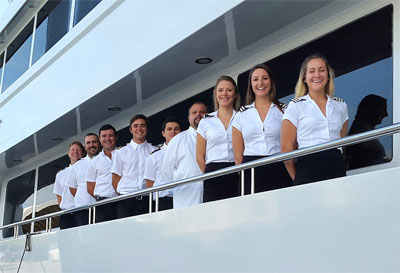
Step 1 - Research
Are you cut out for the lifestyle.
Really think about whether you would suit working on a superyacht – not everyone is cut out for this lifestyle! As luxurious as it may sound, there's a lot of hard work to be done, both physically and mentally.
You’re often dealing with very wealthy and powerful owners, their families, and all their guests. The hours are typically very long and at the same time, you’re sleeping in shared cabins, away from home for extended periods of time, and personal privacy becomes a rarity – and you have to be able to handle all of this whilst maintaining the highest of spirits.
What are the job roles?
You will also need to understand the different job roles. The term ‘yacht crew’ refers to many different roles on board a superyacht; some are more hospitality-focused, such as a steward or stewardess, while others more skill-based, such as an engineer. Whilst you may be planning to enter the industry as a deckhand and work your way up, it’s important to understand the roles, duties, and responsibilities of all crew on board. See the different crew roles explained here .
Step 2 – Prepare
Make sure you have the right training.
There are numerous crew training providers within the superyacht sector and a range of courses and certifications – some of which are mandatory, such as some STCW certificates , while others will simply help you obtain a more desirable set of skills.
Having additional skills (such as another language) and your interests listed on your CV is a huge help in making you stand out from other applicants, so consider which, if any, additional courses you may want complete to help you in obtaining and succeeding in your chosen role before you actively start looking for work.
Get your CV sorted
First things first, you must make sure that you have an up-to-date and professional CV before you can get out there.
Step 3 – Get out there
Yachting hot spots and dock walking.
There are several ways to find work in the yachting world. It is highly recommended to move to the yachting hubs and hiring ports of the world (as crew jobs can come up at any time) and networking in the local yachtie hangouts to get yourself noticed. Different yachting hotspots have their peak periods. You can then be in the right place at the right time to hand deliver your CV to potential employers.
Dock walking is a good way of getting a job, mainly on small yachts. The usual way to obtain crew work is literally to walk the docks and marinas, visit crew agencies and even frequent pubs/cafés used by existing crew.
It is important to dress appropriately, as you are selling yourself. Make sure that you 'look the part' as first impressions count i.e. smart, wearing deck-shoes and a smart shirt (a yacht shirt if you have one).
Almost all crew begin their careers by first doing day work: single, one-off jobs which offer cash and valuable experience. Day work is casual work given by the half day or full day but can stretch into several weeks as the work requires.
It is actually the perfect way to trial different sizes and styles of yacht, to see first-hand how the crew dynamics work and to get a real feel of the work required before committing to a contract.
Of course, casual day work is highly sought after, so it is best to promote yourself as ready, willing and able for work by networking and making contacts and being in the vicinity of the yachts to be able to start work as soon as it becomes available.
Step 4 - Apply and interview
Online opportunities.
Of course, you will find a huge selection of luxury yacht crew positions advertised online. Make sure you register with a specialised super yacht recruitment job-board , such as Yacrew, and upload your CV so that you can easily apply for all suitable positions advertised there. Captains who are looking for crew use these sites to view CVs of suitable candidates.
Attend a job fair
You should also consider attending a specialised recruitment fair. The Cruise Job Fair taking place in London every year is the largest recruitment event within the cruise sector but there are always several recruitment agencies attending who are looking specifically for quality candidates for superyachts.
The advantage of attending an event like this is that you get to meet the recruiters face-to-face, hand over and discuss your CV, get valuable advice and immediate feedback.
Some training centres attend the job fair; they are able to give you valuable advice and help you on your way to getting the right training, skills and qualifications.
The interview process
If you are invited to an interview, then your CV has already caught the eye of the captain or whoever is recruiting for the position! It is important that you make a good impression when you meet in person.
Whether you are a newcomer hoping to land your first contract, or you have previous experience, make sure that you are punctual, smart, prepared with copies of your CV, licences, references, and any other documentation and brush up on your yachting terminology. Be confident, make eye contact and offer a firm handshake. Be clear about your objectives and your career path in the industry, what you will be able to offer as a crew member why you are a good fit for the job.
Of course this will not just be about assessing your skills and abilities, a large part of it will be about your personality and character and whether you will be a good ‘fit’ with the rest of the team on board.
Step 5 – Set Sail
Get on board.
If you are successful at interview, then you will receive a formal job offer to join the yacht.
Good luck and enjoy your time at sea!
Make sure you network as much as possible during the season – as there is a lot of "it’s who you know, not what you know" – and you never know when the next opportunity may present itself!
Career Advice:
Email address:
Remember me Forgotten password?
Password Reset
Enter your email address and we will email you a password reset link.
Email address:

- Yotspot Connect
- Advertise with us
Extra Reading
- Success Stories
- Mental Health
- Seafarer Employment Agreements
- How to get into Yachting 'The Handbook'
Our Partners
- Join the PYA
- Financial Services
- Yacht Brokerage
- Find an ENG1 Doctor
Need Help? Contact our support team
- X / Twitter

Join Yotspot
Advertise your maritime positions with Yotspot, the leading jobs board in the yachting industry. Connect with top candidates for super yacht and shore-based roles. Kickstart your career with Yotspot's extensive job listings, career training, and industry connections to help you chart your professional path.
The Yacht Account
Join and gain unrestricted access to our entire crew database with unlimited postings for Captains, Deckhands Stewardesses and much more...
Sign up free Find out more
The Shorebased Account
Join and gain unrestricted access to our entire database of industry professionals with unlimited postings for Yacht Brokers, Managers, Designers and much more...
The Platinum Account
Are you looking for jobs or work within the yachting industry? Join and access advanced features to assist your job-hunting journey as well as exclusive discounts, deals and benefits...
The Training Account
Join and advertise your maritime training courses including dates & availability to maritime professionals who need them...
Not just crew, 127,351 Professionals
Yotspot matches you with quality crew and yachting professionals from the worldwide yachting industry. Subscribe and gain access today with membership to the Yotspot 24/7 Account .
Begin your search
Select a category
- 127,351 Professionals
- 1,479 Current Jobs
- 6,244 Training Courses
Membership to The Yotspot 24/7 Account enables you to hire people quickly and efficiently. Post a job or search our database to find crew and people for all your maritime needs.

- Jobs & Positions
- Shorebased Roles
- Training Courses
- Starting 1st Sep 2024
- 48m (157ft) Motor Yacht
- Posted Today
- Starting 20th Sep 2024
- 57m (187ft) Motor Yacht
- Starting 10th Sep 2024
- 85m (279ft) Motor Yacht
- 120m (394ft) Motor Yacht
- EUR (€)3,000.00 Per Month
- 68m (223ft) Motor Yacht
- Shore Based Position
- United Kingdom
- GBP (£)8,000.00 Per Month
- Posted Yesterday

- Starting 16th Sep 2024
- GBP (£)7,000.00 Per Month
- Posted 30th Aug 2024

- Starting 30th Sep 2024
- EUR (€)5,000.00 Per Month

- Starting 1st Oct 2024
- 60m (197ft) Motor Yacht
- Starting 2nd Sep 2024
- 50m (164ft) Motor Yacht

- Starting 5th Sep 2024
- 53m (174ft) Motor Yacht
- EUR (€)3,500.00 Per Month

- Starting 1st Nov 2024
- 35m (115ft) Sailing Yacht
- USD ($)275.00 Per Day

- Zephyr Yachting
- 4 day(s) Duration
- EUR (€)1,100

- Stream Marine Training
- Glasgow, Scotland, UK
- 4 hour(s) Duration
- Starting 2nd Sep 2024 with more dates available
- GBP (£)118.80
- 1 day(s) Duration
Looking for work?
With the most comprehensive jobs board in the yachting industry, Yotspot is the perfect place to find your next position. Our job-seeker accounts offer a wide range of features completely free...
- Job alerts on all latest positions
- Personalised routes to certification
- Upload certificates, references & CV
- Share & privacy controls
- plus much more...
Choose from one of our professional job-seeker accounts
Finding your next job on a Superyacht is easy with Yotspot .
Simply create your profile with us and explore the wide range of features we offer. Whether it’s following your personalised career path, searching courses or chosing from hundreds of job roles with yachts our goal is to help you on your next adventure .
Prefer solid ground? Yotspot lists hundreds of shorebased roles within the Yachting industry for you to select from.
Whether you prefer to be office based, or would rather get your hands dirty building or refitting luxury yacht’s we can match you with the perfect role for you.
Lucas Urruty Officer of the Watch (OOW) "I started yachting 7 years ago, from not knowing the industry at all to getting my first OOW position last year. I remember in the first stages of my training I had nobody to guide me on how or in what order or priority to do my modules. I followed the yacht route, and up until now I have always gone back to Yotspot in my career to see what requirements, sea time and courses I need and in what order as a reference. I have booked at least 4 of my modules through Yotspot and even got my current job thanks to the site. It has changed the game in our industry regarding crew, training and so much more, highly recommend! "
Liubov Chunikhovska Ex Chief Stewardess (MY Luna, 100m) "If you're looking for a job or recruiting crew I personally think that Yotspot is the best service in the industry. It basically has everything you need in one place. Yotspot has been crucial to work with professionals and provides a high-level of support. Thank you Yotspot Team and wishing you inspiration to keep going with new ideas along with success!"
Jo Stepien Stewardess/ Masseuse (MY New Secret, 75m) "I have been using Yotspot to find new interesting opportunities since the beginning of my yachting career. I have chosen to look on this platform because it offers full spectrum of options that you want to include in your search such as temporary or rotational position. I haven't seen it on any other yacht job search site and I always found it super useful to specify your search like that and look for the best option for me. Yotspot is a time saver. I have found my current job on it and I am very grateful for that. I will definitely recommend it to any yachtie to create a profile and search for his or her dream job on Yotspot as it's definitely somewhere there!"

Looking to recruit?
The Yotspot 24/7 Account helps you reach a wide and diverse range of professional crew and yachting professionals from a database of 127,351 members , located across the globe.
Post a job for free or search our extensive crew database to review our available members, matched to your exact specifications and ranked in order of suitability. Then filter, sort and shortlist your ideal candidates, add notes, request personalised video interviews and more before hiring the perfect fit for you.
Industry Trusted
We're used by some of the most prestigious yachts, management and recruitment agencies in the world. You're in safe hands.
Post a job for free
Advertise a role for free to see how the platform works. No obligations. It takes less than 5 minutes, go on, give it a go!
Candidate matching
Our matching algorithm % ranks candidates in order of suitability, taking away the stress of hiring someone new.
Access 24/7
The Yotspot 24/7 Account gives you unlimited access to candidates, whenever, wherever, 24/7, 365 days a year.
30 day money back guarantee
User satisfaction is hugely important to us, so much so we guarantee your money back if you’re not completely satisfied.
Adam Handyside Chief Officer/ Relief Captain (MY Madame GU, 99m) "Madame Gu finds the Yotspot site a very effective way of reducing crew placement costs. There appears to be an increasing number of crew who are using it today. The site can be accessed 24hrs a day 7 days a week. The more it's used the more cost effective it becomes. Most traditional Crew Recruitment companies have no such concessions. Yotspot is our first stop when recruiting"
Brooke Holt Crew Coordinator (Sea Shepherd Conservation Society) "Yotspot is super useful as it is available 24/7. The fact that candidates are ranked from most suitable to the role, to least makes it easier to sort the square pegs for the round holes! Each job receives an excellent response rate with often more than one ideal candidate to deliberate over. Over the last three years, we have recruited over 25 crew from Yotspot, all of which have been wonderful additions to the crew. I would certainly recommend anyone needing to hire crew to use the Yotspot service as the value for money is second to none. I can post with confidence everytime. "
Marc Micheletti Captain (MY Eileen, 50m) "I have been using Yotspot since its early inception and I have to say that I keep being very impressed by its simplicity and effectiveness. Not only is it incredibly cost effective, the simplicity of posting a position and looking for crew is amazing. I have also used it myself for looking for employment and it also works really well from an Employee perspective. I am a big fan, keep up the good work Yotspot, you have my full support"

- News & Stories

Employer FAQ’s: Yotspot Back to Basics
What Makes Yotspot Unique? Yotspot is the leading jobs board in the yachting industry, revolutionising superyacht crew recruitment since ...

From the Farm to the Sea: Interview With Superyacht Captain Kelly
Hi Kelly! Tell us a bit about yourself. I grew up the furthest from yachting anyone could imagine, landlocked on a farm in North Central ...

How Gen Z is Transforming the Modern Workplace: Expectations, Prefe...
Generation Z, those born between 1997 and 2012, are now entering the workforce in significant numbers and in the superyacht industry, thi...
The Art of Table scaping as a Yacht Stewardess
Finding accommodation and job opportunities for yacht professionals, top 5 yachting spots to visit in the mediterranean season, keeping fit while working on a superyacht: an interview with a foun..., the yotspot team’s trip to palma international boat show, make yourself capable, make yourself valuable, make yourself the hire..

Browse Yotspot
- Yachting Jobs
- Shorebased Roles
Engineering
Become a member.
Yotspot provides you with the perfect place to find all the crew you need, search & apply to hundreds of jobs and advertise your maritime training courses. Whether you're a Crewmember, Yacht Representative, Recruitment Agency or Training Provider you’ve come to the right place!
Find out more
"Ship Tilted, We Were Thrown": Crew Member On UK Tycoon Mike Lynch Yacht
Matthew Griffiths, who was on watch duty on the night of the tragedy, told investigators that the crew members did everything they could to save those on board the Bayesian, according to comments reported by Italian news agency Ansa.

A crew member on Mike Lynch's yacht has spoken of being thrown into the water and efforts to rescue passengers as a storm sank the vessel off Sicily this month, in a disaster that killed the British tech tycoon and six other people.
Griffiths, the boat's captain James Cutfield, and ship engineer Tim Parker Eaton have been placed under investigation by the Italian authorities for potential manslaughter and shipwreck. Being investigated does not imply guilt and does not mean formal charges will follow.
"I woke up the captain when the wind was at 20 knots (23 mph/37 kph). He gave orders to wake everyone else," Ansa quoted Griffiths as saying.
"The ship tilted and we were thrown into the water. Then we managed to get back up and tried to rescue those we could," he added, describing the events of the early hours of Aug. 19, when the Bayesian had been anchored off the Sicilian port of Porticello.
"We were walking on the walls (of the boat). We saved who we could, Cutfield also saved the little girl and her mother," he said, referring to passenger Charlotte Golunski and her one-year-old daughter. In all there were 15 survivors of the wreck.
Cutfield exercised his right to remain silent when questioned by prosecutors on Tuesday, his lawyers said, saying he was "worn out" and that they needed more time to build a defence case. Parker Eaton has not commented on the investigation.
Prosecutor Raffaele Cammarano said last week that the vessel was most likely hit by a "downburst", a very strong downward wind.
However, the sinking has puzzled naval marine experts, who said a vessel like the Bayesian, built by Italian high-end yacht manufacturer Perini, should have withstood the storm and, in any case, should not have sunk as quickly as it did.
Promoted Listen to the latest songs, only on JioSaavn.com
Prosecutors in the town of Termini Imerese, near Palermo, have said their investigation will take time, with the wreck yet to be salvaged from the sea.
(Except for the headline, this story has not been edited by NDTV staff and is published from a syndicated feed.)
Track Budget 2023 and get Latest News Live on NDTV.com.
Track Latest News Live on NDTV.com and get news updates from India and around the world .
India Elections | Read Latest News on Lok Sabha Elections 2024 Live on NDTV.com . Get Election Schedule , information on candidates, in-depth ground reports and more - #ElectionsWithNDTV
Watch Live News:

Entry Level Yachting Qualifications
Essential courses to kickstart your yachting career.
IIf you are looking for a job in the yachting industry for the first time, certain training courses are essential and others are highly desirable in the eyes of potential employers. We offer a full range of entry-level training courses in Antibes and Palma.
The five-day STCW Basic Safety Training package comprises the MCA-accredited modules: Personal Survival Techniques, Fire Prevention and Fire Fighting, Elementary First Aid and Personal Safety and Social Responsibilities. Together, they form an essential programme of pre-sea training necessary for working on board.
- STCW Basic Crew Training
After mastering the basics, it's time to explore additional courses to enhance your skill set and take on more responsibilities in your career. Some of these courses include:
- Power Boat Level II: Develop your boat handling skills, learning essential techniques like turning, mooring, and anchoring This certification will enhance your professional qualifications, in particular for those that may be involved in tender operations onboard.
- Engineering Courses: For those interested in starting a career in the engineering department onboard, the Approved Engine Course 1 (AEC1) and the Approved Engine Course 2 (AEC2) will expand your technical knowledge base and introduce you to the maintenance and servicing of engines onboard.
- Security Courses: Proficiency in Security Awareness (PSA) provides an introduction to security on board and Proficiency in Designated Security Duties (PDSD) is intended for seafarers taking on security duties on board.
- Find useful information to help you start and pursue a career in the superyacht industry.
- For more information on these courses, do not not hesitate to contact us
| COURSE | Antibes | Palma | E-Learning | |
|---|---|---|---|---|
| €270 | ||||
| €1295 | €1295 | |||
| €450 | €450 |

Authorities Investigating Crew Members of Sunken Yacht, Captain for Manslaughter
No charges have been pressed — yet., plot thickens.
The investigation into the sinking of a yacht earlier this month in Siciliy that killed seven people, including British billionaire Mike Lynch , is expanding. Italian authorities are now including two more crew members in its probe, The New York Times reports , joining the ship's captain, James Cutfield, who has been under a manslaughter inquiry since Monday.
The 184-foot vessel, the Bayesian, capsized while at anchor just minutes after being caught in a storm the morning of August 19. There were 22 people aboard the yacht — 10 crew and 12 passengers — when it went down. Among the seven who died, six were passengers, including Lynch and his 18-year-old daughter Hannah.
Newly under investigation, as of Wednesday, are the ship's engineer Tim Parker Eaton, who manned the engine room, and sailor Matthew Griffith, who was serving as lookout the night of the sinking.
No charges have been pressed yet, because in Italy being investigated doesn't necessarily mean that criminal charges will follow, according to the NYT .
Too Big to Sink
That a ship of the Bayesian's size and caliber sank so easily has raised concern among sailors and investigators — and even the ship's manufacturer , which maintains that it should have been "unsinkable."
There are also questions about why so many passengers perished, while all but one of the crew made it out alive. Raffaele Cammarano, the prosecutor of the case, suggested that the victims may have been asleep while the disaster swiftly unfolded.
Whether any crew members were there to wake them up is "precisely what we are trying to ascertain," he said, as quoted by The Guardian .
So far, only Cutfield, the captain, is under a manslaughter investigation for possible negligence that led to the deaths of the passengers. The 51-year-old New Zealander was interrogated by prosecutors on Tuesday, but exercised his right to remain silent.
All nine of the surviving crew members, including Cutfield, have left Italy, according to the NYT . They were under no obligation to stay there, but were required to appoint legal representation before leaving, Reuters reported .
Dredging Up
The investigation is still in its nascent stages, but several red flags have already cropped up.
Giovanni Costantino, CEO of the Italian Sea Group, which owns the Bayesian's builder Perini Navi, argued in an interview with Italian newspaper Corriere della Sera that the ship being at anchor was one of them. He suggests that the crew may have failed to follow proper procedures , such as lifting anchor, steering into the storm, and securing all doors and hatches.
According to CBS News , which cites reports by Italian media, prosecutors are investigating whether Eaton, the Bayesian's engineer, neglected to use security systems that automatically closed all these openings in the ship's hull, which could explain why it sank so rapidly.
But to reiterate, no one has been charged yet. A crucial stage of the investigation will be salvaging the shipwreck, which currently lies 165 feet under the sea, and that will take considerable time.
More on maritime disasters: Billionaire Yacht Was Piloted Recklessly Before Deadly Sinking, Its Builder Warns
Share This Article
The Straits Times
- International
- Print Edition
- news with benefits
- SPH Rewards
- STClassifieds
- Berita Harian
- Hardwarezone
- Shin Min Daily News
- Tamil Murasu
- The Business Times
- The New Paper
- Lianhe Zaobao
- Advertise with us
Crew member on tech tycoon Mike Lynch’s stricken yacht tells of being thrown into water
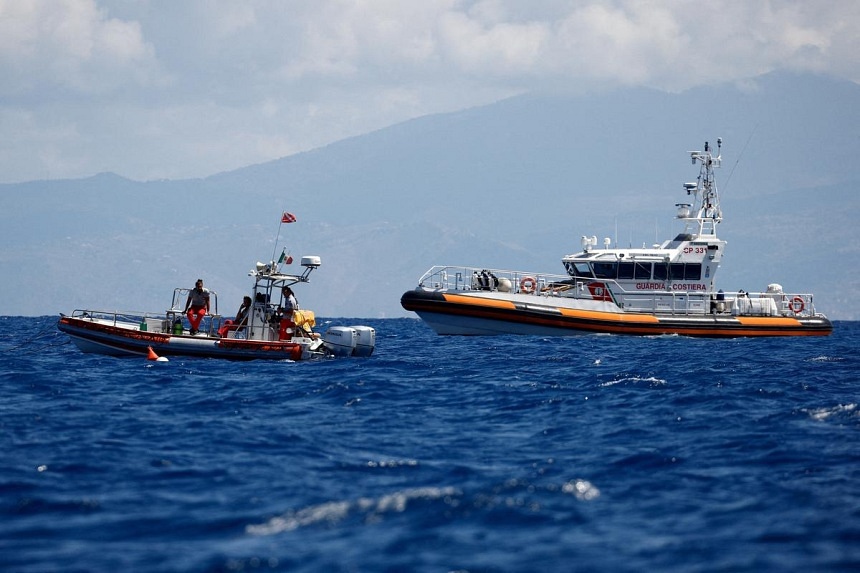
ROME - A crew member on Mike Lynch's yacht has spoken of being thrown into the water and efforts to rescue passengers as a storm sank the vessel off Sicily in August, in a disaster that killed the British tech tycoon and six other people.
Mr Matthew Griffiths, who was on watch duty on the night of the tragedy, told investigators that the crew members did everything they could to save those on board the Bayesian, according to comments reported by Italian news agency Ansa.
Mr Griffiths, the boat's captain James Cutfield, and ship engineer Tim Parker Eaton have been placed under investigation by the Italian authorities for potential manslaughter and shipwreck.
Being investigated does not imply guilt and does not mean formal charges will follow.
"I woke up the captain when the wind was at 20 knots (37kmh). He gave orders to wake everyone else," Ansa quoted Mr Griffiths as saying.
"The ship tilted and we were thrown into the water. Then we managed to get back up and tried to rescue those we could," he added, describing the events of the early hours of Aug 19, when the Bayesian had been anchored off the Sicilian port of Porticello.
"We were walking on the walls (of the boat). We saved who we could, Cutfield also saved the little girl and her mother," he said, referring to passenger Charlotte Golunski and her one-year-old daughter.
In all, there were 15 survivors of the wreck.
Mr Cutfield exercised his right to remain silent when questioned by prosecutors on Aug 27, his lawyers said, saying he was "worn out" and that they needed more time to build a defence case.
Engineer Mr Parker Eaton has not commented on the investigation.
Prosecutor Raffaele Cammarano said last week that the vessel was most likely hit by a "downburst", a very strong downward wind.
However, the sinking has puzzled naval marine experts, who said a vessel like the Bayesian, built by Italian high-end yacht manufacturer Perini, should have withstood the storm and, in any case, should not have sunk as quickly as it did.
Prosecutors in the town of Termini Imerese, near Palermo, have said their investigation will take time, with the wreck yet to be salvaged from the sea. REUTERS
Join ST's Telegram channel and get the latest breaking news delivered to you.
- Accidents - maritime
Read 3 articles and stand to win rewards
Spin the wheel now

COMMENTS
Training courses for yacht crew and those who are looking for jobs on yachts: STCW, deck, engine, interior, culinary, etc.
There are currently over 15,000 yachts in the world that require qualified crew. A career in yachting industry can be rewarding, exciting and a wonderful opportunity to travel the world and explore new horizons!
Attending boat shows, yachting events, and joining online forums can help you make valuable connections and learn about job openings. Furthermore, registering with a reputable yacht crew agency can increase your chances of finding the perfect position.
Hours, Salaries, and Expectations. Yacht crew is a service job at its core, and every yacht owner is looking for service-oriented people who understand how to deliver a hotel-quality living and restaurant-quality fine dining. Work experience in luxury hotels and restaurants is a big plus for some jobs, and makes breaking into yacht work easier.
Qualifications required to work on board a yacht All crew, regardless of their position on board, need to have completed the STCW Basic Safety Training along with obtaining a recognised Seafarers medical certificate, the most popular being the ENG1 which is issued by an MCA (Maritime and Coastguard Agency) professional medic.
How to work on a Superyacht. Follow this step by step guide for new yacht crew members: start in the yachting industry, pass your mandatory certifications, find your first job, and excel in private and charter yachts. Learn about daywork and dockwalk opportunities to land your first full-time job.
A: Common yacht crew certifications include yacht crew health and wellness, STCW (Standards of Training, Certification, and Watchkeeping for Seafarers), ENG1 Medical Certificate, RYA (Royal Yachting Association) Certifications, and PYA (Professional Yachting Association) Certifications. Q: Are yacht crew certifications internationally ...
On these courses, you will get your standard STCW certificate and a list of extra qualifications demonstrating your competence, ability, and commitment to the industry. Deckhands will learn how to drive a small yacht, engine maintenance, general yacht repair, and how to clean teak properly.
Become Yacht crew with our Superyacht training packages and full STCW certificates in Europe and worldwide.
Courses and Qualifications To be in the best position to secure that dream position on-board your chosen yacht, it is important for potential crew to know which qualifications are preferred, and how to go about getting them.
What are the basic Entry Qualifications to become yacht crew ? For employment on a commercially registered superyacht, the minimum requirement for all crew is basic safety training.
International Yacht Training Worldwide is the global leader in International Certificate of Competence, Superyacht Crew training, and Diveboat maritime training.
Professional Yacht Training is the Crew School Favored by Yacht Crew Around the World. With more "likes" and "5-star" reviews than other crew training schools, we are confident that you too will find PYT to be your "best" and most well suited choice in yacht crew training.
Yacht crew salaries are a complex mix of vessel type, location, qualifications, and performance-based rewards. By exploring this guide, you'll gain valuable insights into this fascinating aspect of the yachting industry.
Alongside sourcing the latest yacht crew jobs worldwide, Bluewater offers a range of specialised yacht crew training courses. Whether you're new to the superyacht industry seeking entry-level qualifications, an experienced deckhand or engineer aiming to advance your career, or a dedicated crew member looking to enhance your resume with certifications like HELM (Human Element Leadership and ...
Alongside sourcing the latest yacht crew jobs worldwide, Bluewater offers a range of specialised yacht crew training courses. Whether you're new to the superyacht industry seeking entry-level qualifications, an experienced deckhand or engineer aiming to advance your career, or a dedicated crew member looking to enhance your resume with certifications like HELM (Human Element Leadership and ...
Yacht Training A job as yacht crew requires many skills, varied training and numerous certificates. The specialists at The Crew Network (TCN) are experts in job profiling and finding the right candidates for roles. Our recruiters can advise on yachting training programmes and qualifications to help you progress your career in yachting.
Yacht crew training courses offered by Professional Yacht Training - PYTUSA. Classes you need to work on a yacht. Fort Lauderdale, FL.
The superyacht recruitment process explained in 5 steps. Find out how to get a job on a yacht.
Leading yacht crew training provider, Bluewater offers quality yacht crew training for yachties joining the industry and seasoned yacht crew members.
The Yotspot 24/7 Account is an online service for finding superyacht crew, jobs & positions within the maritime industry. Search training courses and much more.
We offer MCA and RYA courses in Antibes (France) and Palma (Spain), tailored to yacht crew at every stage of their yachting journey. Our comprehensive training encompasses all essential modules to support seafarers in achieving the highest standards of professionalism within the yachting industry. View full Price List Book Courses.
A crew member on Mike Lynch's yacht has spoken of being thrown into the water and efforts to rescue passengers as a storm sank the vessel off Sicily this month, in a disaster that killed the ...
We offer a full range of entry-level training courses in Antibes and Palma. The five-day STCW Basic Safety Training package comprises the MCA-accredited modules: Personal Survival Techniques, Fire Prevention and Fire Fighting, Elementary First Aid and Personal Safety and Social Responsibilities. Together, they form an essential programme of pre ...
The 184-foot vessel, the Bayesian, capsized while at anchor just minutes after being caught in a storm the morning of August 19. There were 22 people aboard the yacht — 10 crew and 12 passengers ...
ROME - A crew member on Mike Lynch's yacht has spoken of being thrown into the water and efforts to rescue passengers as a storm sank the vessel off Sicily in August, in a disaster that killed the ...